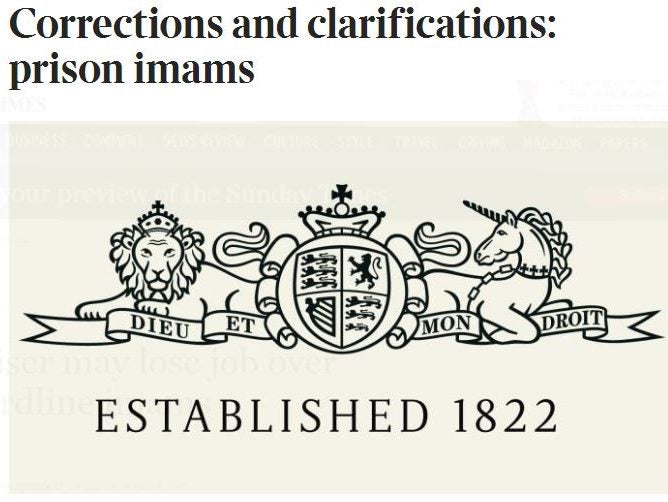
A Sunday Times article that called leaders of a religious sect hired by a government jails adviser ‘hardline imams’ was inaccurate, according to press regulator IPSO.
The newspaper reported that a government adviser on Islam faced losing his job after he authorised the “recruitment of 140 prison imams who hold anti-British views”.
The article claimed the Deobandi Islam preached by the imams was a “hardline Sunni interpretation of Islamic scripture contrary to British value and human rights”.
It carried the headline: “Jails adviser may lose job over hiring hardline imams” with the same text appearing in print and online.
But a complaint by Dr Rafaqut Rashid was upheld by the Independent Press Standards Organisation after he claimed Deobandi Islam was a reference to an institute of Islamic education in Deoband, India.
He said scholars who studied at the school were often known as ‘Deobandi’ simply by their association with the institute and that they have different interpretations on many matters.
He also claimed not all institutions termed Deobandi follow the same Islam.
The IPSO committee found that it was not clear from the article that the claims about Deobandi Islam were the views of the newspaper’s security source and had been wrongly presented as fact.
They acknowledged the position that the vast majority of Muslims who might be identified as Deobandi were not “hardline” and did not hold views “contrary to British values and human rights”.
However, Dr Rashid conceded there were some Deobandi Muslims who he said behaved “inappropriately”.
The newspaper also provided evidence which demonstrated some Deobandi Muslims held beliefs contrary to British values that could reasonably be characterised as “hardline”.
As a result of the ruling, the newspaper has amended the online article to make clear the claims are those of one of its sources.
It has also been ordered to add a footnote to the online article, and publish a print correction, explaining the claims were those of a source, rather than the newspaper’s own view.
Email pged@pressgazette.co.uk to point out mistakes, provide story tips or send in a letter for publication on our "Letters Page" blog
